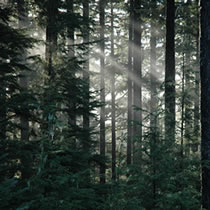
 |
|
|
July 11, 2008
Suit Filed to Stop Timber Sales in Alaska's TongassFrom a Cascadia Wildlands Project press release:Environmental groups sued the U.S. Forest Service in federal court today arguing that the agency has concealed impacts of old-growth logging to the environment and to subsistence hunting in four Tongass National Forest timber projects. At issue is whether environmental impact statements have thoroughly evaluated the effect of the projects on Sitka black-tailed deer - a species that is key to viability of the "Islands Wolf" (Alexander Archipelago wolf) and is among the most important subsistence foods in the area. 
The plaintiffs are Greenpeace and Cascadia Wildlands Project, both of which have offices in Alaska. They say the Forest Service has violated bedrock environmental laws by deliberately ignoring their legitimate criticisms of how impacts to deer were assessed in the decision process and not providing a "full and fair discussion" of their concerns. While not a plaintiff in the suit, the Alaska Department of Fish & Game has repeatedly challenged these same flaws. "The Forest Service has misapplied the science and has stonewalled all challenges," said Greenpeace forest campaigner Larry Edwards. "We have sought resolution for years. Now the courts are the only recourse." The lawsuit demands that the four logging projects be stopped and that supplemental analysis be ordered to fairly evaluate their impacts. Combined, the projects would take 33 million board feet of timber from 1,700 acres of old-growth forest and construct 9.5 miles of new, permanent logging roads. "Ancient forest logging reduces the ability of the forest to sustain deer in winter," said Gabe Scott, Alaska field representative for Cascadia Wildlands Project in Cordova. "When old-growth forests are logged, deer become more vulnerable to population collapses during hard winters, and the Tongass has had recent record-setting snowfalls consistent with climate change factors for the region. Deer are a vital food source both for residents of the region and the Islands Wolf." The Tongass, America's largest national forest, has been a flashpoint of controversy for decades. It is the world's largest remaining temperate rainforest that is still relatively intact. Even so, viability of Tongass wildlife species - the Islands Wolf prominent among them - is a well acknowledged concern. In 1997, the Forest Service avoided a 'threatened' listing of the Islands Wolf under the Endangered Species Act by including a protective standard in its then new Tongass Forest Plan. The standard was intended to protect both the wolf's "viability and wide distribution" and the needs of families that depend on deer for food on the table. "The rule the Forest Service was forced to adopt is in the way of its ambition to expand the Tongass timber program," Edwards said. "We think it is no accident that the agency's deer habitat modeling errors all work in one direction - consistently overestimating habitat by as much as 120 percent and consequently underestimating logging impacts." Chris Winter of the Crag Law Center is representing the plaintiffs in the case. © AlaskaReport.com All Rights Reserved. |
|